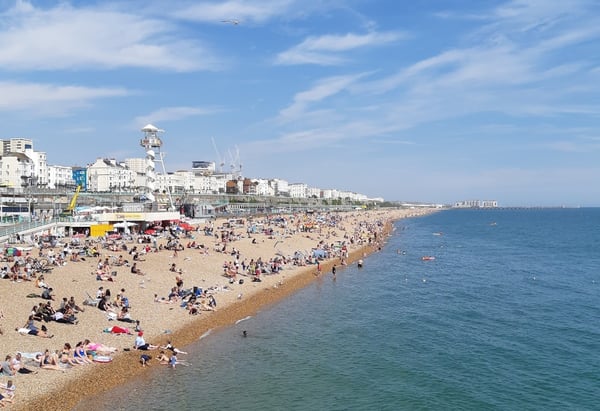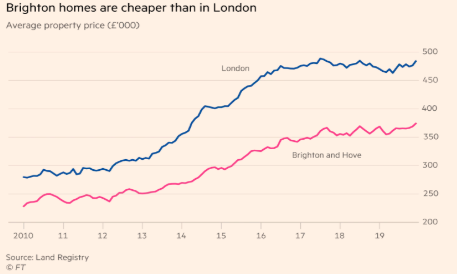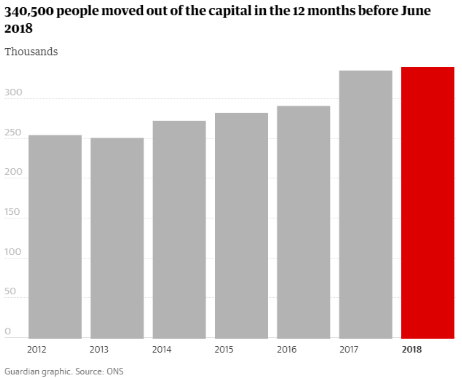Exoduses are nothing new, it even happens really early on in the Bible, but the recent outpouring of people from London, combined with Brexit and all its political and economic undertones and overtones, has some analysts scratching their heads regarding the future of the capital as a business hub and a city to call home. But why have London’s inhabitants been fleeing the city in droves and where have they been going? The answer to the first question is not so simple, several reasons have been offered, some focusing on issues such as a lack of affordable housing and increasing levels of air pollution and crime, whereas others cite more political factors such as Brexit, the introduction of taxes on second properties and council tenants being hit by the ‘bedroom tax’. The second question is not so complex… everyone is moving down to Brighton.

Brighton, or London-by-the-Sea as it has been dubbed by its hip and savvy residents, is attracting a large percentage of those leaving London in search of a cheaper and better life. Bala Bailey, a freelance cameraman and his wife Jenny, a Media Studies lecturer, moved from Hackney to Hove in 2015 and have never looked back. ‘I’m just so much happier now,’ says Bala as he takes a sip from his iced coffee. We are seated outside the Small Batch cafe on Norfolk Square on the border of Brighton and Hove, the sun is shining, the other tables are all full of chattering twenty or thirtysomethings and everyone seems to be laughing at some shared inside joke that I, as a resident of London, don’t get. ‘I mean, just look around,’ continues Bala, waving a casual hand in the general direction of everything in our vicinity, so I do as I’m told, and am suitably impressed. Brighton benefits from becoming popular in the Regency period and remaining popular for the next 100 or so years, meaning that it is graced with some truly stunning architecture - nearly all of the buildings in the city are grade 1 or 2 listed buildings. At the end of the road, I can see the English Channel shimmering and the silhouettes of couples holding hands as they stroll along the promenade. Opposite us, groups of young people are stretched out in a small public garden, reading books or chatting with friends… and it’s a Tuesday morning. I nod in concession.
Bala is not alone. He is what the locals call a DFL - Down From London - and there are thousands of them in Brighton. I ask Bala why he moved DFL, and his answer comes quickly, ‘No choice,’ he says. ‘We were just about to buy a 2 bedroom flat in Hackney for £400,000, but realised that it would leave us completely broke. When we visited some friends who had moved down here a couple of years before, that was it, we were hooked. We bought a three bedroom house with a garden in Hove for £320,000 and haven’t stopped smiling since.’ I ask Bala what’s so special about Brighton, and this time he is not so quick to answer. After a thoughtful pause he says one word, ‘Life’. Of course, I ask him to expand his answer a little. ‘There’s an energy here that you usually only get in capital cities… London used to have it, but now it’s just for millionaires, Brighton has everything that London has - shops, restaurants, art galleries, museums, theatres, bars, cinemas, you name it, Brighton has it, but with the sea thrown in for good measure.’

I leave Bala sipping his frappe on the terrace with a good book - doesn’t anyone work in this town? - and head down to the beach. The seafront promenade is wide enough to drive a bus down it and is full of people taking in the sea air. Brighton’s stony beach is hardly the stuff that tropical dreams are made of, but Bala is right to say that it is an attraction. In the past, the model of urban exodus was simple, you lived in a cramped flat in the city with your mates when you were in your twenties and then got married, got a pay-rise and moved out to the leafy suburbs around London to buy a house and start a family. That basic model is very different now. Twentysomethings simply can’t afford to live in the capital any more, with rent often comprising 50% of your salary and the cost of living increasing at a far higher rate than wages, young people are seeking an alternative. It is thought that up to a million people in their twenties left London between 2015 and 2019, and the number of people exiting the capital is increasing year on year, and many are heading to the coast.

I meet another old friend who has escaped the ‘Smoke’ in favour of the seaside. It is now after 12, so we meet for a pint rather than a coffee. I’ve known Paul Dunglinson all my life, we went to school together, but I hardly recognise him when we meet, he has grown his hair long and has it tied back in a ponytail and his skin is the colour of beechwood. ‘Didn’t recognise me, did you?’ he laughs as we shake hands and sit down at a table. I admit that I didn’t, and ask him what the transformation is in aid of. ‘Don’t know really, it’s just this place,’ he says with the same casual arm gesture that Bala had used just an hour or so before. We are sitting outside a beachfront pub called The Fortune of War. I had taken the liberty of getting us a couple of pints of cold beer before Paul arrived as he was late and I was early. ‘You just feel so free here,’ he continues, taking a big gulp of lager and smacking his lips together. ‘It has all the things that London has and more and for a fraction of the cost… even beer is cheaper,’ he laughs.
Like Bala, Paul has swapped life in London for life by the sea. He sold his one bedroom flat in Hammersmith for £490,000 in 2017 and bought a 3 bedroom flat in Eaton Place, a fabulous Victorian crescent in East Brighton for under £400,000. Unlike Bala, though, Paul has carried on working in London and commutes three or four times a week. ‘The commuting was difficult at first,’ he explains, ‘but I’ve sort of got into it now. It’s only 50 minutes and I get straight into Victoria. I just read a book and listen to music or do some work on my laptop. I don’t go in every day, I work from home up to three days a week, so it’s quite painless really.’ I ask him if he’s working today. ‘I am actually,’ he laughs as he takes another gulp of beer. Honestly, how does anyone get anything done in this place? Everyone is either drinking coffee or beer on a Tuesday. As Paul and I sit in the sun, chatting about old times and new, I start to realise something, that I have the same grin on my face that Paul has and Bala had. The happiness that seems to fill the air has somehow filled me and when I leave Paul and head back up to the station to catch my train back to my home in Leytonstone, I seem to be floating on air, I nod at others who also seem to be carried along on this invisible wave of contentment and they nod back knowingly. I start to think about how much I could get for my 3 bedroom flat in East London and wonder what I could buy down here with the proceeds… only 50 minutes commute, he said. I notice an estate agent and, although it means I will miss my train, I enter.






